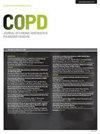香烟烟雾提取物通过 ROS/ IP3R/Ca2+ 途径诱导 Calu-3 细胞中 MUC5AC 的表达
IF 3.1
3区 医学
Q1 Medicine
International Journal of Chronic Obstructive Pulmonary Disease
Pub Date : 2024-07-12
DOI:10.2147/copd.s469866
引用次数: 0
摘要
背景:慢性阻塞性肺病(COPD)是由暴露于有害的外部颗粒、空气污染和吸入香烟烟雾引起的。气道粘液分泌过多,尤其是粘蛋白 5AC (MUC5AC),是慢性阻塞性肺病的一个重要病理特征,与慢性阻塞性肺病的发生和发展有关。本研究旨在探讨香烟烟雾提取物(CSE)对 MUC5AC 表达的影响,尤其是活性氧(ROS)诱导 MUC5AC 表达的机制:方法:在体外Calu-3细胞中研究了CSE对MUC5AC和粘蛋白5B(MUC5B)表达的影响。采用定量反转录聚合酶链反应(qRT-PCR)、免疫荧光染色和酶联免疫吸附试验(ELISA)测定了 MUC5AC 和 MUC5B 的表达水平。使用 DCFH-DA 和 Fluo-4 AM 测定细胞中 ROS 和 Ca2+ 的总水平。随后,用 Western 印迹法测定了 IP3R、IRE1α、p-IRE1α 和 XBP1s 的表达水平。使用小干扰 RNA 实现了基因沉默:结果:我们的研究结果表明,暴露于 CSE 会增加 MUC5AC 的水平,并上调 ROS、IP3R/Ca2+ 和未折叠蛋白反应(UPR)相关因子。此外,使用 siRNA 敲除 IP3R 可减少 CSE 诱导的 Ca2+ 生成、UPR 相关因子和 MUC5AC 表达。此外,10 mM N-乙酰-l-半胱氨酸(NAC)处理可抑制 CSE 的影响,包括 ROS 生成、IP3R/Ca2+、UPR 激活和 MUC5AC 过表达:我们的研究结果表明,ROS 通过 IP3R/ Ca2+ 信号调节 CSE 诱导的 UPR 和 MUC5AC 过表达。此外,我们还发现 NAC 是一种有望缓解 CSE 诱导的 MUC5AC 过表达的治疗药物。本文章由计算机程序翻译,如有差异,请以英文原文为准。
Cigarette Smoke Extract Induces MUC5AC Expression Through the ROS/ IP3R/Ca2+ Pathway in Calu-3 Cells
Background: Chronic obstructive pulmonary disease (COPD) is caused by exposure to noxious external particles, air pollution, and the inhalation of cigarette smoke. Airway mucus hypersecretion particularly mucin5AC (MUC5AC), is a crucial pathological feature of COPD and is associated with its initiation and progression. In this study, we aimed to investigate the effects of cigarette smoke extract (CSE) on MUC5AC expression, particularly the mechanisms by which reactive oxygen species (ROS) induce MUC5AC expression.
Methods: The effects of CSE on the expression of MUC5AC and mucin5B (MUC5B) were investigated in vitro in Calu-3 cells. MUC5AC and MUC5B expression levels were measured using quantitative reverse transcription-polymerase chain reaction (qRT-PCR), immunofluorescence staining, and enzyme-linked immunosorbent assay (ELISA). Total cellular levels of ROS and Ca2+ were determined using DCFH-DA and Fluo-4 AM. Subsequently, the expression levels of IP3R, IRE1α, p-IRE1α and XBP1s were measured by Western blotting. Gene silencing was achieved by using small-interfering RNAs.
Results: Our findings revealed that exposure to CSE increased MUC5AC levels and upregulated ROS, IP3R/Ca2+ and unfolded protein response (UPR)-associated factors. In addition, knockdown of IP3R using siRNA decreased CSE-induced Ca2+ production, UPR-associated factors, and MUC5AC expression. Furthermore, 10 mM N-acetyl-l-cysteine (NAC) treatment suppressed the effects of CSE, including ROS generation, IP3R/ Ca2+, UPR activation, and MUC5AC overexpression.
Conclusion: Our results suggest that ROS regulates CSE-induced UPR and MUC5AC overexpression through IP3R/ Ca2+ signaling. Additionally, we identified NAC as a promising therapeutic agent for mitigating CSE-induced MUC5AC overexpression.
Methods: The effects of CSE on the expression of MUC5AC and mucin5B (MUC5B) were investigated in vitro in Calu-3 cells. MUC5AC and MUC5B expression levels were measured using quantitative reverse transcription-polymerase chain reaction (qRT-PCR), immunofluorescence staining, and enzyme-linked immunosorbent assay (ELISA). Total cellular levels of ROS and Ca2+ were determined using DCFH-DA and Fluo-4 AM. Subsequently, the expression levels of IP3R, IRE1α, p-IRE1α and XBP1s were measured by Western blotting. Gene silencing was achieved by using small-interfering RNAs.
Results: Our findings revealed that exposure to CSE increased MUC5AC levels and upregulated ROS, IP3R/Ca2+ and unfolded protein response (UPR)-associated factors. In addition, knockdown of IP3R using siRNA decreased CSE-induced Ca2+ production, UPR-associated factors, and MUC5AC expression. Furthermore, 10 mM N-acetyl-l-cysteine (NAC) treatment suppressed the effects of CSE, including ROS generation, IP3R/ Ca2+, UPR activation, and MUC5AC overexpression.
Conclusion: Our results suggest that ROS regulates CSE-induced UPR and MUC5AC overexpression through IP3R/ Ca2+ signaling. Additionally, we identified NAC as a promising therapeutic agent for mitigating CSE-induced MUC5AC overexpression.
求助全文
通过发布文献求助,成功后即可免费获取论文全文。
去求助
来源期刊

International Journal of Chronic Obstructive Pulmonary Disease
RESPIRATORY SYSTEM-
CiteScore
5.10
自引率
10.70%
发文量
372
审稿时长
16 weeks
期刊介绍:
An international, peer-reviewed journal of therapeutics and pharmacology focusing on concise rapid reporting of clinical studies and reviews in COPD. Special focus will be given to the pathophysiological processes underlying the disease, intervention programs, patient focused education, and self management protocols. This journal is directed at specialists and healthcare professionals
 求助内容:
求助内容: 应助结果提醒方式:
应助结果提醒方式:


